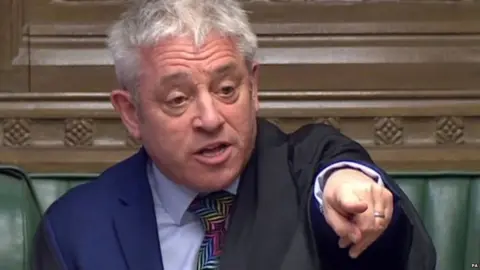John Bercow: A lesson from history on the limits of the Speaker's powers

 BBC
BBCA hung Parliament, a Speaker in the firing line, controversial rulings leading to accusations that the chair is biased.
Not 2019, but 1976.
Not John Bercow, but George Thomas.
Not Brexit, but the nationalisation of shipbuilding.
This was the issue that provoked the famous incident where Michael Heseltine seized the Mace, the symbol of the Commons' authority and waved it at Labour MPs.
The background was that Speaker Thomas, a Labour veteran and former secretary of state for Wales, had ruled that the Aircraft and Shipbuilding Industries Bill, a nationalisation measure extremely important to the then Labour government, was a hybrid bill (that is a bill that affects different shipyards in different ways), and therefore its consideration could not continue.
This ruling may have sounded very technical, but essentially it knocked out a key piece of government legislation, and marked a considerable victory for the Conservative opposition.
The ruling was also seen as a betrayal of the Labour tribe in which the Speaker had been raised - tellingly, Neil Kinnock, then a fiery left-wing backbencher shouted out "Vote Labour, George" just before he delivered it.
"I am sure that Jim Callaghan and the rest of the Labour leadership never really forgave me…" he wrote in his memoirs.
Bluntly, many Labour ministers thought he became a Conservative stooge.
There were no similar scenes when John Bercow this week ruled that the prime minister's Brexit deal could not be brought back for a third "meaningful vote" without substantial changes - but it was a moment of huge parliamentary significance, because it stopped the government making repeated attempts to pass the deal, a tactic viewed by some MPs as unduly coercive.
But what the ruling does not do is make it impossible for the government to bring the same deal back.
 PA
PAThe sequel to the events of 1976 could provide a precedent for this year's controversy; the then Clerk of the Commons, Sir Richard Barlas, advised the government that they could push through a motion saying that, notwithstanding the Speaker's ruling, they could go on with their bill - and, woundingly for Speaker Thomas, they did.
The lesson for today is that if there is a majority for something in the House of Commons, the House can get its way.
MPs can, and frequently do, bend or discard inconvenient rules.
They regularly drop the rules about the timing of different stages of legislation to rush bills through.
And if there was a majority for some revamped version of the prime minister's Brexit deal, then it could be put to the House if MPs passed a "paving motion" setting aside Mr Bercow's ruling.
All of which makes the spate of front pages denouncing the Speaker look a little overblown.
His ruling may be inconvenient for the PM, but all she needs to get round it is, er, a majority.
There is another point to be made; the Brexit crisis has highlighted details of the way the Commons is run which are normally the preserve of parliamentary studies scholars - and in particular the vital importance of the government's control of the Commons agenda.
Overwhelmingly, ministers decide what gets debated on and how complicated report stage votes are structured, and these can be critical.
(To be sure, there are backbench debates, but there are careful limitations around what can be debated - backbench time cannot be used for legislation, for example.)
What Speaker Bercow has done on a couple of occasions is to give a potential Commons majority opportunity to manifest itself, as when he controversially allowed an amendment by Dominic Grieve to a government business of the House motion.
Essentially he is not allowing the current government to behave as if it enjoyed a Tony Blair-style majority, when it has no majority at all.
Ministers can hardly be expected to enjoy this - they certainly believe he has leaned too far towards Labour - and the result has been some splendidly vitriolic exchanges with Commons leader Andrea Leadsom.
But the ultimate lesson is that in a hung Parliament the chair has considerable power, and using that power is certain to make them unpopular with someone.
